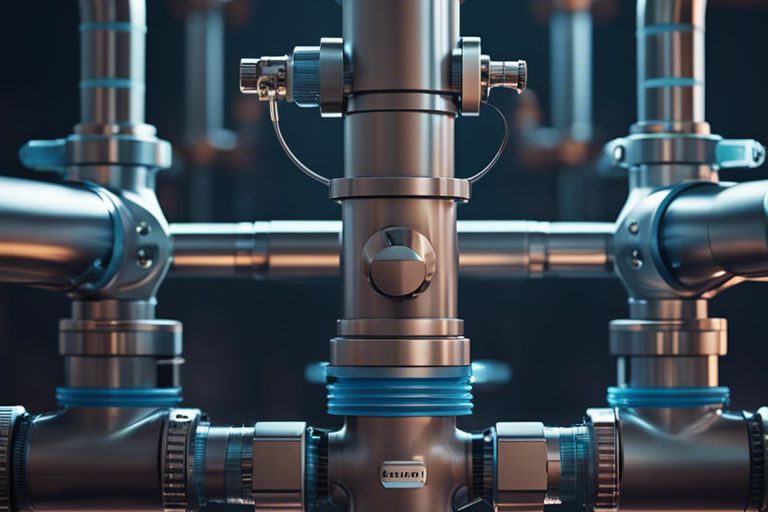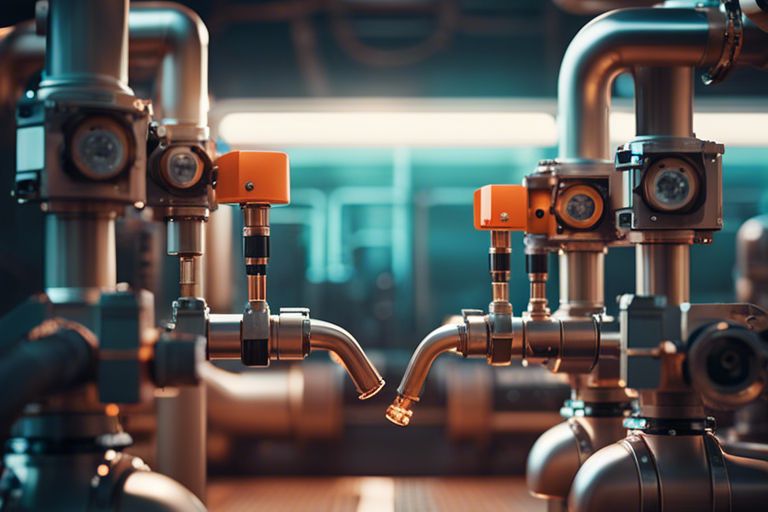Just as artificial intelligence (AI) continues to revolutionize various industries, it is also making significant strides in automated plumbing systems. In recent years, AI technology has been integrated into plumbing systems to enhance efficiency, improve maintenance, and reduce costs. These advancements in AI-powered plumbing demonstrate the potential for smarter, more sophisticated water management systems.
Key Takeaways:
- Improved Efficiency: AI advancements in automated plumbing systems have significantly improved efficiency in water usage and system maintenance.
- Real-time Monitoring: These systems can provide real-time monitoring of water flow, pressure, and leaks, allowing for immediate detection and response to issues.
- Predictive Maintenance: AI can predict potential failures in the plumbing system, enabling proactive maintenance to prevent costly repairs.
- Energy Savings: Automated plumbing systems can optimize energy usage by adjusting water heating and pumping based on real-time demand.
- Remote Control: Users can remotely monitor and control their plumbing systems through mobile apps, offering convenience and peace of mind.
- Data Analytics: AI technology can analyze large amounts of data from plumbing systems to provide insights for better decision-making and resource management.
- Sustainability: Automated plumbing systems contribute to sustainability efforts by reducing water waste and energy consumption, leading to a more eco-friendly operation.

The Evolution of Plumbing Automation
Any AI Plumbing: A Guide to Using AI in Your Marketing for Plumbers enthusiast can appreciate the advancements in automated plumbing systems. These innovations have revolutionized the way plumbing systems function and have significantly enhanced efficiency and effectiveness in the industry.
Historical Context of Plumbing Technology
Plumbing has come a long way from its humble origins in ancient civilizations like the Indus Valley and Mesopotamia, where the first systems of plumbing were rudimentary channels made of clay and stone. Over time, advancements such as lead pipes in ancient Rome and the widespread use of copper pipes in the 20th century paved the way for modern plumbing as we know it today.
Milestones in Automated Plumbing
Plumbing automation has seen significant milestones in recent years, with the integration of sensors, actuators, and smart algorithms to create self-regulating systems that can detect leaks, regulate water flow, and even anticipate maintenance needs. These automated plumbing systems not only improve efficiency but also help prevent costly water damage and reduce overall water consumption.
Context: These advancements in plumbing automation represent a paradigm shift in the industry, moving towards smarter and more sustainable solutions. With the use of AI and machine learning, plumbing systems can now adapt to changing conditions in real-time, offering unprecedented control and insight into operations. As technology continues to evolve, the future of automated plumbing systems looks promising, with possibilities for even greater efficiency and eco-friendliness on the horizon.
AI Technologies Shaping Plumbing Automation
Machine Learning and Data Analysis
It is no secret that data is at the core of AI advancements in automated plumbing systems. Machine learning algorithms rely heavily on data analysis to identify patterns and make predictions. By analyzing large amounts of historical plumbing data, these algorithms can learn to detect anomalies, predict potential issues, and optimize system performance.
Predictive Maintenance Algorithms
Data plays a crucial role in the development and implementation of predictive maintenance algorithms in plumbing automation. These algorithms use historical and real-time data to anticipate when maintenance is required, helping to prevent costly breakdowns and reduce downtime. By leveraging AI technologies, plumbing systems can now become proactive rather than reactive in their maintenance approach.
Machine learning models within predictive maintenance algorithms can assess the condition of plumbing components, predict failures before they occur, and schedule maintenance tasks accordingly. This predictive approach not only saves time and money but also extends the lifespan of plumbing systems.
Robotics and IoT Integration
Technologies such as robotics and the Internet of Things (IoT) are revolutionizing plumbing automation. Robotics can perform intricate tasks with precision and speed, while IoT devices enable real-time monitoring and control of plumbing systems. By integrating robotics and IoT, plumbers can remotely diagnose issues, schedule repairs, and even perform maintenance tasks autonomously.
The integration of robotics and IoT in plumbing automation enhances efficiency, reduces human error, and provides valuable insights into system performance. With real-time data collection and analysis, plumbing systems can now operate with greater intelligence and effectiveness.
Benefits and Challenges of AI in Plumbing
Increased Efficiency and Cost Savings
With the integration of AI in plumbing systems, there has been a significant increase in efficiency and cost savings. Smart sensors and AI algorithms are able to accurately detect leaks, assess water flow, and optimize heating and cooling processes in real-time, leading to reduced water waste and energy consumption. This level of automation allows for preemptive maintenance, preventing costly repairs and minimizing downtime.
Regulatory and Ethical Considerations
Regulatory bodies are grappling with the implications of AI in plumbing, especially concerning data privacy, cybersecurity, and liability issues. As AI systems collect and analyze sensitive data to optimize performance, there are concerns about unauthorized access and misuse of information. Ethical considerations also come into play, such as ensuring that AI algorithms do not discriminate or perpetuate biases in the plumbing industry.
Cost-effective solutions must be implemented to address regulatory and ethical concerns while harnessing the full potential of AI in plumbing systems. This includes establishing clear guidelines for data handling, implementing robust cybersecurity measures, and promoting transparency in the AI algorithms used. Collaboration between industry stakeholders, policymakers, and tech experts is vital to navigate the complex landscape of regulation and ethics in AI-driven plumbing technologies.
Design and Implementation
For The Future of Home Services: How AI Impacts Plumbers and Electricians, advancements in automated plumbing systems have revolutionized the way plumbing services are delivered. The design and implementation of AI in plumbing systems have significantly enhanced the efficiency and accuracy of plumbing operations.
Systems Architecture for AI Plumbing Solutions
Architecture plays a crucial role in the development of AI plumbing solutions. The systems architecture for AI plumbing solutions involves the integration of sensors, data analytics, and machine learning algorithms to create a smart plumbing system. These systems can monitor water flow, detect leaks, and even predict potential issues before they occur. By leveraging AI technology, plumbing systems can autonomously optimize water usage and reduce wastage, leading to cost savings for homeowners.
Integration with Existing Plumbing Infrastructures
On the path to modernizing plumbing systems, integration with existing plumbing infrastructures is a key consideration. AI advancements in plumbing solutions aim to enhance the capabilities of traditional plumbing setups rather than replace them entirely. Integrating AI technology with existing plumbing infrastructures involves retrofitting sensors and smart devices to enable data collection and analysis. This integration allows for real-time monitoring of plumbing systems and proactive maintenance to prevent costly repairs.
Plus, AI-enabled plumbing systems can provide homeowners with valuable insights into their water usage patterns and potential areas for improvement. By incorporating AI into existing plumbing infrastructures, homeowners can enjoy greater convenience, efficiency, and peace of mind knowing that their plumbing systems are smart and reliable.
AI-Powered Diagnostics and Monitoring
Real-Time Data Tracking and Analysis
All automated plumbing systems equipped with AI technology rely on real-time data tracking and analysis to ensure optimal performance. By constantly monitoring various parameters such as water flow, pressure levels, temperature, and water quality, AI algorithms can detect any anomalies or potential issues before they escalate into major problems. This proactive approach not only helps in preventing costly breakdowns but also enhances the overall efficiency of the plumbing system.
Fault Detection and Remote Troubleshooting
For efficient maintenance, AI-powered automated plumbing systems are capable of fault detection and remote troubleshooting. Through continuous monitoring of the system’s performance, AI algorithms can quickly identify any faults or malfunctions. In case of an issue, remote troubleshooting can be initiated, where the AI system can pinpoint the problem area and even suggest potential solutions. This not only saves time but also reduces the need for manual intervention, leading to quicker resolution of plumbing issues.
Plus, with the ability to collect and analyze data over time, AI-powered plumbing systems can learn from past issues and improve predictive maintenance strategies. This continuous learning process enables the system to become more accurate in fault detection and troubleshooting over time, making it a reliable and efficient solution for modern plumbing needs.

Training and Skill Development for Professionals
Educating Plumbers on AI System Management
Despite the traditional nature of the plumbing industry, advancements in technology, particularly in Artificial Intelligence (AI), have prompted a shift towards automated plumbing systems. With this shift, there is a growing need to educate plumbers on how to effectively manage AI systems within plumbing infrastructure.
System training programs that focus on AI system management can help plumbers understand the intricacies of these advanced systems, including troubleshooting common problems, monitoring performance metrics, and ensuring optimal functionality. By equipping professionals with the knowledge and skills to navigate AI-driven plumbing solutions, the industry can elevate standards of service and efficiency.
The Future of Plumbing: Upskilling and Reskilling
The advancement of automated plumbing systems necessitates a paradigm shift in the skill sets required for plumbers. Upskilling and reskilling initiatives are crucial to ensure that professionals remain relevant and competitive in a rapidly evolving industry. Automation, IoT integration, and AI implementation are key focus areas for the future of plumbing.
For instance, plumbers may need to learn how to interface with smart devices, interpret data analytics generated by AI algorithms, and optimize plumbing systems for energy efficiency and sustainability. By investing in continuous education and training programs, professionals can adapt to the changing landscape of plumbing technology and deliver enhanced services to meet the demands of modern consumers.
Conclusion
Presently, AI advancements in automated plumbing systems have revolutionized the way plumbing tasks are managed and executed. The integration of artificial intelligence has not only improved efficiency but also enhanced the overall performance and reliability of plumbing systems. Through machine learning algorithms and predictive analytics, these systems can detect issues before they escalate, resulting in timely and cost-effective solutions.
Looking ahead, the future of automated plumbing systems with AI holds immense potential for further streamlining operations and optimizing resource utilization. As technology continues to evolve, we can expect even more sophisticated solutions that will continue to shape the plumbing industry and bring about significant benefits in terms of savings, sustainability, and enhanced user experience.
FAQ
Q: What are AI advancements in automated plumbing systems?
A: AI advancements in automated plumbing systems refer to the integration of artificial intelligence technology to enhance the efficiency and accuracy of plumbing processes.
Q: How does AI technology benefit automated plumbing systems?
A: AI technology benefits automated plumbing systems by optimizing water usage, detecting leaks and malfunctions, predicting maintenance needs, and improving overall system performance.
Q: What is the role of machine learning in automated plumbing systems?
A: Machine learning algorithms are used in automated plumbing systems to analyze data, learn patterns of usage, and make predictive decisions to improve water conservation and reduce operational costs.
Q: Can AI help in preventing water wastage in plumbing systems?
A: Yes, AI can help prevent water wastage in plumbing systems by identifying inefficiencies, detecting leaks in real-time, and providing prompt alerts for maintenance or repair.
Q: How can AI enhance the maintenance of automated plumbing systems?
A: AI can enhance the maintenance of automated plumbing systems by monitoring system performance, predicting potential issues, scheduling preventive maintenance tasks, and optimizing repair processes.
Q: Are there any security concerns related to AI in automated plumbing systems?
A: Security concerns related to AI in automated plumbing systems include data privacy risks, potential cyber-attacks on connected devices, and the need for robust cybersecurity measures to safeguard sensitive information.
Q: What is the future outlook for AI advancements in automated plumbing systems?
A: The future outlook for AI advancements in automated plumbing systems is promising, with continued innovation in AI-driven technologies to further enhance water efficiency, sustainability, and operational performance in buildings and infrastructure.